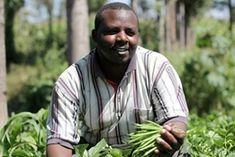
The first Fairtrade-certified green beans will go on sale in British supermarkets this month, creating new opportunities for hundreds of small impoverished Kenyan farmers who currently sell directly to plantations.
Under new Fairtrade standards launched in September last year, outgrowers in Africa who have mostly formed themselves into self-help groups and farmers’ associations and were not certifiable under previous Fairtrade standards can now sell under Fairtrade terms and be supported to become smallholder producers within six years of certification.
The Fair Development Fund from Sainsbury’s has been involved in supporting the new standards, which allow access for small-scale farmers, as well as providing technical agricultural support.
The first beans to the UK will come from a group of 23 outgrowers from Mweiga. They sell to Homegrown Kenyan Ltd, a Fairtrade-certified plantation that buys in vegetables from small-scale farmers from 10 areas located in the higher rainfall areas of Kenya.
Stephen Kairu is from a farmers’ association of 10 farmers from the Mweiga group. He lives with his wife Mercy Nyambura and two daughters, as well as his mother and sister and her two children. Kairu rents four acres of land and grows vegetables on three of them. His main cash crops are fine beans, garden peas and baby corn, which are planted between the fine beans to maximise land use.
Kairu dreams of owning his own farm and creating a better life for his children, which he hopes the Fairtrade premium will help him achieve. “Primary education is now free, but few children continue into secondary education because it is expensive,” he explains. “I would really like to give them the best education possible. And then they can go to greater heights.”
The biggest challenges that the farmers face is a lack of water, unfavourable weather and changes in consumer demand that make their markets unstable, create insecurity and make their incomes unpredictable. Fairtrade certification will mean that the farmers will receive at least the Fairtrade guaranteed minimum price, which is calculated to cover costs of sustainable production. As well as the Fairtrade premium to invest in community projects, they will also receive support to build and strengthen the capacity of their farmers’ organisations.
The first batch of Fairtrade-certified beans, extra fine green beans and boston beans will go on sale in Marks & Spencer and Sainsbury’s.
Harriet Lamb, executive director of the Fairtrade Foundation, says: “This is an exciting opportunity for those most in need of Fairtrade and will mean that they will be able to move from being a small group of farmers selling directly to a plantation, to becoming an organised small producer organisation, selling in their own right on Fairtrade terms. In the long term, they and their families and communities will directly benefit from the Fairtrade minimum price and the Fairtrade premium, to invest in community development projects.”
The farmers who will decide democratically how to invest the premium say that plans include building a local secondary school, as the nearest one is very far to travel to, and constructing a clinic to improve access to medical treatment. As water is a big concern, they say they would like to invest in water conservation projects, including improved irrigation schemes to reduce waste, replacing water channels with pipes and digging water pans to collect rainwater and run-off from the fields.



